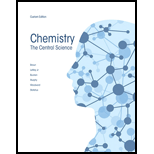
The following data compare the standard enthalpies and free energies of formation of some crystalline ionic substances and aqueous solutions of the substances:
| Substance | ΔHof(kJ/mol) | ΔGof(kJ/mol) |
| AgNO3(s) | -124.4 | -33.4 |
| AgNO3(aq) | -1017 | -34.2 |
| MgSO,(s) | -1283.7 | -1169.6 |
| MgSO4(aq) | -1374.8 | - 1198.4 |
Write the formation reaction for AgNO3(s). Based on this reaction, do you expect the entropy of the system to increase or decrease upon the formation of AgNO3(s)? (b) Use ΔHofand ΔGofof AgNO3(s) to determine the entropy change upon formation of the substance. Is your answer consistent with your reasoning in part (a)? (c) Is dissolving AgNO3 in water an exothermic or endothermic process? What about dissolving MgSO4 in water? (d) For both AgNO3 and MgSO4, use the data to calculate the entropy change when the solid is dissolved in water, (e) Discuss the results from part (d) with reference to material presented in this chapter and in the “A Closer Look” box on page 820.
Want to see the full answer?
Check out a sample textbook solution
Chapter 19 Solutions
CHEMISTRY:CENTRAL SCI.-W/ACCESS>CUSTOM<
- Determine whether the following reaction is an example of a nucleophilic substitution reaction: Br OH HO 2 -- Molecule A Molecule B + Br 义 ollo 18 Is this a nucleophilic substitution reaction? If this is a nucleophilic substitution reaction, answer the remaining questions in this table. Which of the reactants is referred to as the nucleophile in this reaction? Which of the reactants is referred to as the organic substrate in this reaction? Use a ŏ + symbol to label the electrophilic carbon that is attacked during the substitution. Highlight the leaving group on the appropriate reactant. ◇ Yes O No O Molecule A Molecule B Molecule A Molecule B टेarrow_forwardPlease correct answer and don't used hand raitingarrow_forwardPlease correct answer and don't used hand raitingarrow_forward
- Pheromone G of the maize stalk borer, chilo partelus, can be synthesized based on the partial scheme shown below. Complete the scheme by identifying the structures of the intermediate compounds A, B, C, D, E, F and pheromone G. Indicate stereochemistry where relevantarrow_forwardQ8: Draw the resonance structures for the following molecule. Show the curved arrows (how you derive each resonance structure). Circle the major resonance contributor. одarrow_forwardQ9: Explain why compound I is protonated on O while compound II is protonated on N. NH2 DD I II NH2arrow_forward
- Complete the following reaction by identifying the principle organic product of the reactionarrow_forwardDenote the dipole for the indicated bonds in the following molecules. ✓ H3C CH3 B F-CCl3 Br-Cl H3C —Si(CH3)3 CH3 OH HO HO H HO OH vitamin Carrow_forward(a) What is the hybridization of the carbon in the methyl cation (CH3*) and in the methyl anion (CH3)? (b) What is the approximate H-C-H bond angle in the methyl cation and in the methyl anion?arrow_forward
 Chemistry: An Atoms First ApproachChemistryISBN:9781305079243Author:Steven S. Zumdahl, Susan A. ZumdahlPublisher:Cengage Learning
Chemistry: An Atoms First ApproachChemistryISBN:9781305079243Author:Steven S. Zumdahl, Susan A. ZumdahlPublisher:Cengage Learning Chemistry: The Molecular ScienceChemistryISBN:9781285199047Author:John W. Moore, Conrad L. StanitskiPublisher:Cengage Learning
Chemistry: The Molecular ScienceChemistryISBN:9781285199047Author:John W. Moore, Conrad L. StanitskiPublisher:Cengage Learning Chemistry: Principles and PracticeChemistryISBN:9780534420123Author:Daniel L. Reger, Scott R. Goode, David W. Ball, Edward MercerPublisher:Cengage Learning
Chemistry: Principles and PracticeChemistryISBN:9780534420123Author:Daniel L. Reger, Scott R. Goode, David W. Ball, Edward MercerPublisher:Cengage Learning Chemistry by OpenStax (2015-05-04)ChemistryISBN:9781938168390Author:Klaus Theopold, Richard H Langley, Paul Flowers, William R. Robinson, Mark BlaserPublisher:OpenStax
Chemistry by OpenStax (2015-05-04)ChemistryISBN:9781938168390Author:Klaus Theopold, Richard H Langley, Paul Flowers, William R. Robinson, Mark BlaserPublisher:OpenStax Chemistry for Engineering StudentsChemistryISBN:9781337398909Author:Lawrence S. Brown, Tom HolmePublisher:Cengage Learning
Chemistry for Engineering StudentsChemistryISBN:9781337398909Author:Lawrence S. Brown, Tom HolmePublisher:Cengage Learning World of Chemistry, 3rd editionChemistryISBN:9781133109655Author:Steven S. Zumdahl, Susan L. Zumdahl, Donald J. DeCostePublisher:Brooks / Cole / Cengage Learning
World of Chemistry, 3rd editionChemistryISBN:9781133109655Author:Steven S. Zumdahl, Susan L. Zumdahl, Donald J. DeCostePublisher:Brooks / Cole / Cengage Learning





